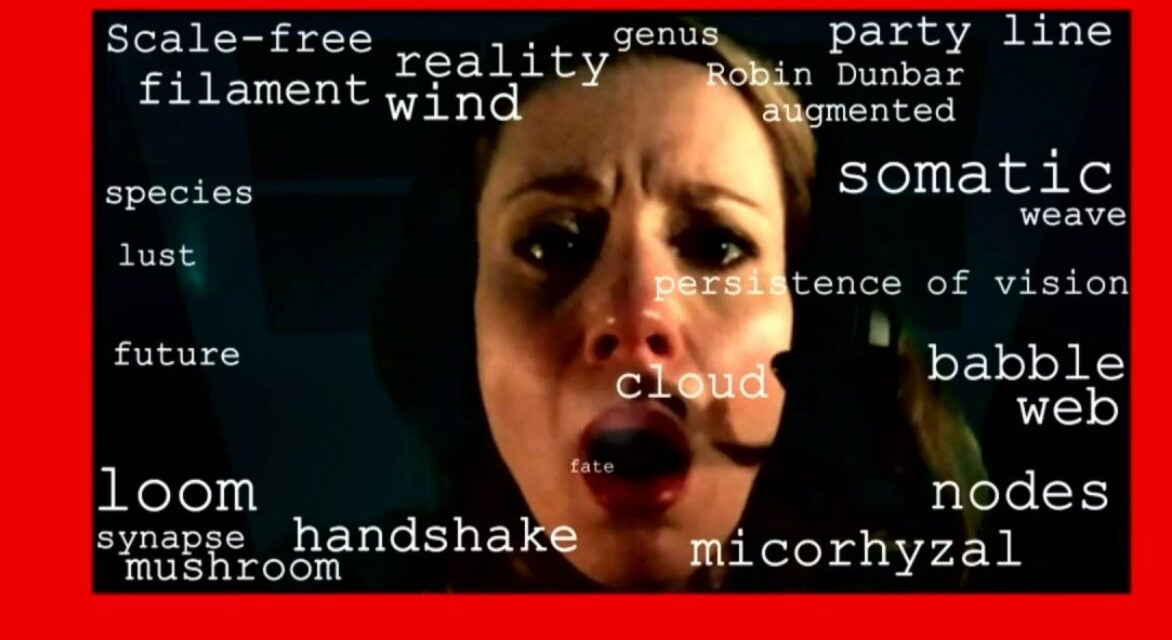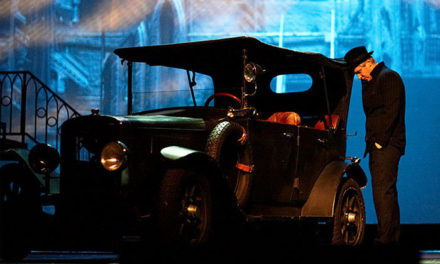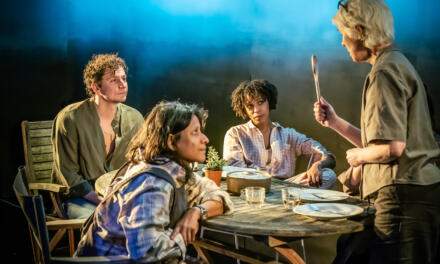Tarragon Theatre’s technological foray into the virtual reality of a Covid-19 lockdown begins with news of a murder, specifically, the brutal slaying of Clytemnestra at the hands of her son Orestes. But Orestes’ isolation in what appears to be a virtual cell – he has been ‘deplatformed- is not the result of any court imposed sentence; this son of Agamemnon, played by Cliff Cardinal, was acquitted of his crime, and now languishes, cut off from his million-plus followers. His only true connection his sister, Electra, played by the mesmerizing Krystin Pellerin.
Orestes springs half-mad from the Greek shocked mind of playwright Rick Roberts, who did a remarkable pivot when the lockdown threatened to cancel his scheduled production of Orestes in the Tarragon season. Roberts has envisioned by turns a steamy, disturbing, and startlingly relevant virtual world to encompass his play. He had help. The production was rehearsed and recorded in Zoom and then moved to LIVELAB.
Yes, this is all coming to you live! So live in fact that if you were absorbed in the side bar chat you might have missed the technical glitch when an actor’s computer suddenly went off line before a key scene. I, frankly, didn’t catch it. Not because I was absorbed in the inane chat – you should have to pass a questionnaire to be admitted to a chat room on Greek tragedy – but because so much is happening on screen. Shifting scenes with multiple virtual backgrounds, word clusters, and sudden opportunities to “follow” one performer or another, kept me engaged, hand hovering over my mouse.
All of which should not overshadow the fact that this is an exciting script. Roberts revels in the moral dilemma of a matricidal son with Cardinal alternating between curled up despair and unleashed rage. The script’s strengths are on full display when characters take centre green screen, breaking through the din of imagistic overload with the power of words scrawled deeply into the frail flesh of the human condition. David Fox as Tyndareus subjects Orestes to a witheringly righteous rant, while Richard Clarkin as Menelaus, still in thrall to Helen (Lisa Ryder), delivers a queasily balanced speech to the masses. Tyndareus, too morally set in his ways, is a man of the past, a distant country where murder mattered. His jabs at Orestes wound, but fail to subdue. Menelaus, reeking of Helen’s aura, speaks to us, and his followers, from the floor of a citadel of democracy where he slyly neutralizes his transgressions. Yes, it’s been a long haul, but let’s forget I said that lie or embarked on this war, and move on. And the people buy it. As they always do. Ryder’s Helen is cut straight from the cloth of the Odyssey, her glib responses admitting no culpability, her beauty undiminished by the suffering she has caused. Being Helen isn’t easy; shed a tear. But it is Electra, played by Kryistin Pellerin, with her words of warning and wisdom, her woefully magnetic gaze, who most commands the screen, guiding and probing, watching and waiting for the inevitable loss of more than she can bear. Follow her.
Tarragon’s Orestes succeeds in proving that the theatrical mind of its director, Richard Rose is ever adept, ever agile and deserves much commendation for drawing compelling performances from actors confined to four walls and hastily configured homemade studios, pacing out their characters lives in a tiny circle of space, speaking to an audience they can’t hear, playing off the silence of the void. So, the key components that make this production worth watching are the writing, the directing, and the acting.
Virtual reality poses additional challenges to set and costume designer Shannon Lea Doyle, and lighting designer Kimberly Purtell. Turning the individual living spaces of an ensemble of actors into functioning performances spaces, while accommodating the onscreen special effects of a virtual background, means working on multiple stages, none of which was designed for an audience. The simple black box stage is going to look very welcoming after this.
I suspect that LIVELAB has an image library. I recognized Orestes’ 3-walled confinement from a BBC trailer for King Charles lll, and the special digital effect that should be labeled “Salvadore Dali/surreal face-cut” is to be avoided. But our digital image library is that of a corporate monopoly – I’m speaking in broad terms here – exercising its heavy hand, grabbing from the imaginations of genuine creators. A world the antithesis of the theatre. It will pass. It is passing. If noble attempts are successful we may see the online landscape transformed for the better by the time the pandemic is over (or as we catch our breath before the next one). In the meantime, it has been instructional to appreciate how much the online world controls us, by feeding on us, instead of us controlling it, and being thus nourished. A minor theme of Orestes, but one worth noting.
It takes courage and a great team to navigate an entirely new reality, to bring a playwright’s vision to online life, and to do it amid the changing lockdown restrictions that bind our current reality. In a post-show talk back (Thurs, Feb 4) the actors and creative team looked giddy with relief, and exhaustion.
I hope this adventure has enabled the artists involved to benefit artistically and financially from this exercise of their considerable talents. Do not, I repeat, do not illegally pilfer this work! Let this Orestes not appear on pirated platforms; the irony would be too great.
Orestes streams live until February 14. To buy tickets – and please do – go to:
https://www.tarragontheatre.com/plays/orestes/
Orestes is written by Rick Roberts, directed by Richard Rose featuring performances by Cliff Cardinal, Richard Clarkin, Bren Eastcott, David Fox, Eleanor Guy, Jeff Ho, Krystin Pellerin, Anthony Perpuse, Lisa Ryder, and Gabriella Sundar Singh.
Stage Manger is Sarah Miller.
Lighting Designer, Kimberly Purtell; Set and Costume Designer, Shannon Lea Doyle; Video and Stream Designer and Operator, Frank Donato; Web Interface, Ian Garrett; Lighting Interface Designer, Joey Morin.
A production of the Tarragon Theatre, Toronto.
Laurie Fyffe is an Ottawa based playwright, reviewer for Capital Critics Circle.
This post was written by the author in their personal capacity.The opinions expressed in this article are the author’s own and do not reflect the view of The Theatre Times, their staff or collaborators.
This post was written by Laurie Fyffe.
The views expressed here belong to the author and do not necessarily reflect our views and opinions.


















